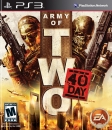adriane23 said:
Veknoid_Outcast said:
adriane23 said:
Veknoid_Outcast said:
[...]
|
[...]
|
The point is well taken. But I disagree about setting aside personal opinions. I think we seek out reviews for the expert opinion of the reviewer. Every critic has standards and priorities when it comes to movies, music, or video games in this case, and these should be on full display in a review. If a critic put aside his personal opinions, he's not really a critic anymore.
I see what you and Xxain are saying with this Double Dragon review, but I think that's more a matter of taste than professionalism. A critic can have bad taste and still be a competent, professional reviewer.
|
If a critic puts aside his personal opinions to critique something, he's the definition of a critic.
If I didn't like FPS games and reviewed Halo 4, I can't be taken seriously if I bash it for being in first person. As a professional, I should only critique it for what it's trying to accomplish, and how it stacks up against its contemporaries in its genre.
|
That is entirely wrong. If a critic puts aside his personal opinions, he's no longer a critic. It's the job of a critic to operate in the space between audience and medium, interpreting the medium in an intelligent, lucid, and stylish way. By definition, a critic is a judge, and he must use his own standards and interpretations to judge the material at his disposal.
Without personal opinions, a critic is just an empty vessel, regurgitating to his audience only the facts of the medium. We read critical reviews because we want something more than facts and figures. We want to be entertained, we want to be educated, and we want the expert opinion of someone who understands the medium better than we do.































































